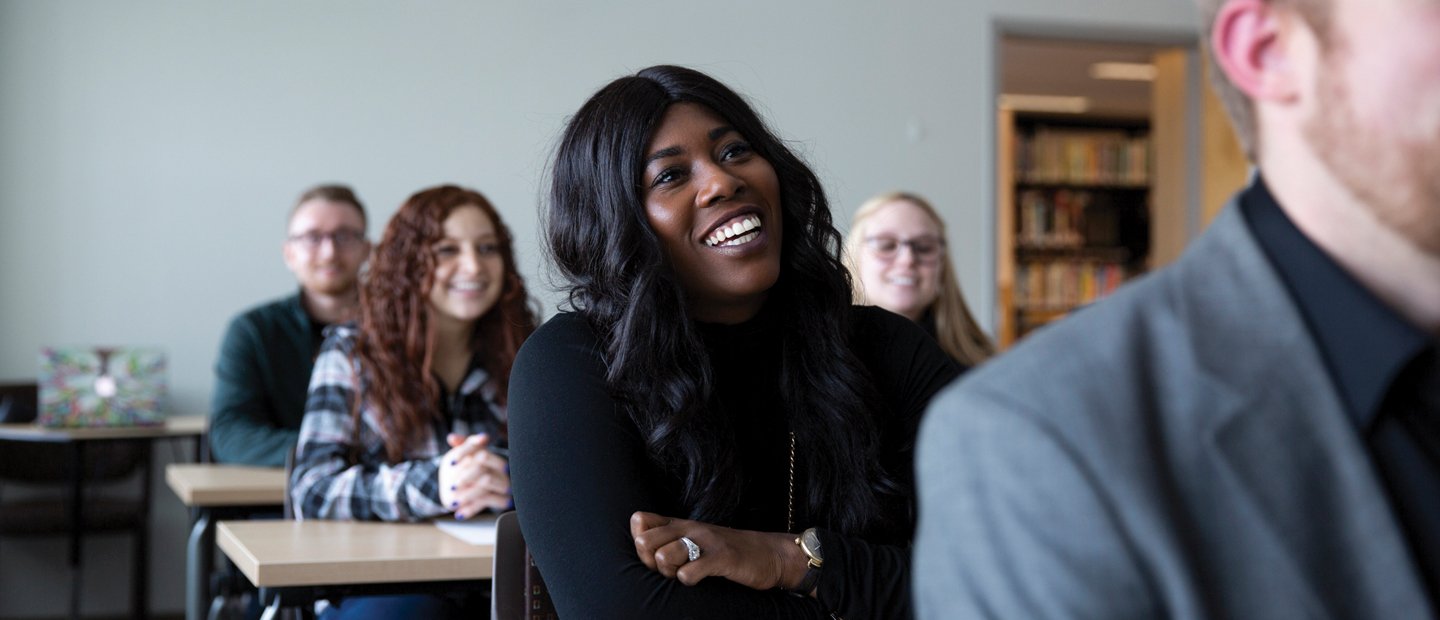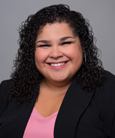
MASTER OF EDUCATION IN HIGHER EDUCATION LEADERSHIP
The Master of Education in Higher Education Leadership (MAHEL) program is a full-time, cohort-based program. Students have the opportunity to study both academic affairs and student affairs. The program values social justice and encourages students to think critically about institutional inclusiveness. It also emphasizes the integration of theory and practice through a capstone internship opportunity. Classes are held during the evening.
PROGRAM OVERVIEWAPPLY NOWREQUEST MORE INFORMATION
Application Deadlines
Students are strongly encouraged to submit applications by April 15th as on-campus enrollment may be limited.
- April 15 (regular)
- June 15 (late)
If you are interested in a graduate assistantship at Oakland University, it is advised that you apply to our program first. Obtaining an assistantship is not the same as being admitted to MAHEL.
Program Goals
The program goals are designed to respond to the dynamic nature of the higher education marketplace. Specifically, students in the higher education program will have the tools needed to:
- Create post-secondary institutions capable of educating students for the knowledge economy
- Create and sustain environments that promote social justice
- Apply the latest theories, research and best practices
Social Justice | What is social justice higher education training?
Social Justice education draws upon an interdisciplinary body of scholarship that identifies issues related to educational equity. Students will acquire a fundamental understanding of the intersection between social identity and participation in social institutions, particularly higher education. Thus, the program explores the history and current status of social inequities as a means to equip students with information necessary to inform higher education policies and practices. Essentially, social justice education emphasizes the equitable distribution of resources, consideration of diversity and social responsibility
The mission of the Higher Education program is to develop transformational leaders who meet professional standards, understand leadership for social justice and think critically about promoting post-secondary institutions that are optimal sites for teaching and learning.
Graduates of our program will have the tools to incorporate the most effective higher education theories and research into their practice. Specifically, students will be able to advance their careers in entry to mid-level higher education administrative positions. Additionally, students will be equipped with the skills and knowledge to pursue an advanced degree in higher education or related fields.
For additional information, please contact:
Program Coordinator: Thandi Sulé, Ph.D.
248-370-4339
[email protected]
480 E Pawley Hall
Administrative Secretary: Kathleen Kampo
(248) 370-4109
[email protected]
475E Pawley Hall
The Master of Education in Higher Education Leadership requires 32 credit hours of study, including a capstone internship experience.
Program Course Offerings
For a list of courses, view the graduate catalog.
Capstone Internship Requirements
The MAHEL program requirements include a capstone internship experience. The internship is designed to give students the opportunity to reflect on the cumulative material learned throughout the program and to apply that knowledge in a practice setting. Students must complete 128 internship hours. At the end of their internships, students will create a portfolio that is cumulative of their internship experience and the previous semesters in the program.
- Internships are completed at the end of coursework and are individually designed by the student in cooperation with the course instructor and a field mentor who is an experienced administrator.
- The field mentor may not be an instructor of any course the student has taken nor the student’s immediate supervisor.
- Internships are undertaken in a setting other than the student's current employment positions, though they may be completed on the same campus. For example, if a student is employed in Undergraduate Admissions, they will need to pursue an internship in a different office or department, such as the Office of the Registrar.
Length, spacing and font:
- 500 words to 750 Words
- Single-spaced
- 12 point font
We are very interested in learning about your background and what prompted you to pursue a masters degree in higher education. Please address the following in your personal goal statement:
- Why you want a masters degree in higher education
- Qualifications and experiences that make you uniquely prepared for MAHEL
- How you can contribute to the MAHEL learning environment
- Your academic and professional goals
- Your vision of higher education equity
- Any problems or inconsistencies in your academic or professional record
- Post-secondary schools attended and degrees attained
- Relevant work experience (including volunteer work)
- Relevant organization memberships
- Career goals
Why do students choose the MAHEL program?
Students select MAHEL to advance their careers in entry to mid-level higher education positions. Additionally, these students generally have a keen interest in social justice issues in higher education.
Admissions Information
- What is the application deadline? April 15 (regular) - June 15 (late)
- Is the GRE required? No
- Can I enroll on a part-time basis? No. Students take two classes per semester.
- Can I enroll during the winter for the on-campus program? As MAHEL is a Cohort program, winter enrollment is very limited. It is strongly advised to apply to start the Fall semester. Students also have the option of starting with a summer course to ease into the program.
- What are the admissions requirements? In addition to a 3.0 GPA and 2 letters of recommendation, prospective MAHEL students must submit a “program specific” goal statement and resume.
- Do I need experience working in higher education to apply to this program? No. You need a keen interest in a higher education service and leadership.
Program Information
- Do you have graduate assistantships? Yes, we do. For additional information, view the graduate assistantships webpage.
- What’s a Capstone Internship? The internship gives students an opportunity to reflect on the cumulative material
learned throughout the program and to apply that knowledge in a practice setting.
Students must complete 128 internship hours. At the end of their internships, students will create a portfolio that is cumulative of their internship experience and coursework. - How many students are in each cohort? Based on previous years’ data, approximately 10-15 students per cohort.
- When are classes held? Classes are held in the evening from 5:30 pm to 8:50 pm from Mon-Thurs. Most classes are on Tuesday and Thursday evening.
- What kind of job could I get? Entry to mid-level positions in: Residence Life, Admissions, Multicultural Student
Services, Student Activities, Advising, Community Outreach, Recreation, Athletics, Pre-college programs, Global Education, Faculty Development, and Academic Departments. - What is the employment rate of graduates? Approximately 90% of MAHEL graduates find career in higher education within 3
months of graduation. Higher Education is a booming field with many opportunities. Given the diversity in higher education, the field welcomes individuals with varied experiences, skills, and interests. - When are courses taught? Course are taught in the evenings from 5:30 to 8:50 from Monday-Thursday. Most
classes are on Tuesday and Thursday. - Can I receive financial aid? Yes, Oakland University offers financial aid. Use the following links for additional information:
For Additional Information:
Higher Education Coordinator
Dr. Thandi Sulé
[email protected]
 "Social justice in higher education is a commitment to today’s developing leaders to dismantle oppressive systems and provide an equitable future for tomorrow. Its core is in the development of equitable, just systems and opportunities that advance all students despite the hierarchy that has historically excluded many. Social justice in higher education is a life-long commitment to diversifying spaces, creating equitable systems, and fighting for change. It’s learning to stand and fight together in spaces designed to keep us apart."— Alaina Wood, 2020
"Social justice in higher education is a commitment to today’s developing leaders to dismantle oppressive systems and provide an equitable future for tomorrow. Its core is in the development of equitable, just systems and opportunities that advance all students despite the hierarchy that has historically excluded many. Social justice in higher education is a life-long commitment to diversifying spaces, creating equitable systems, and fighting for change. It’s learning to stand and fight together in spaces designed to keep us apart."— Alaina Wood, 2020
 "Social justice in higher education is the distribution of fairness and equity. It is to allow all students regardless of their background to feel safe and secure physically and psychologically. In addition, the university should also have a variety of resources that will support all students to be successful. It’s also important for a university community to learn, understand and accept the uniqueness of individuals. To be aware of inequity opportunities in-class and out of class and be willing to reflect on oneself to practice equity." — Jade Vang, 2021
"Social justice in higher education is the distribution of fairness and equity. It is to allow all students regardless of their background to feel safe and secure physically and psychologically. In addition, the university should also have a variety of resources that will support all students to be successful. It’s also important for a university community to learn, understand and accept the uniqueness of individuals. To be aware of inequity opportunities in-class and out of class and be willing to reflect on oneself to practice equity." — Jade Vang, 2021

“Social justice is a necessary tool in creating diversity and inclusion in postsecondary education. It empathizes the importance of sharing knowledge and developing resources that can be used to create equitable access for disadvantaged populations.” — Kendra Agee, 2015
 “Social Justice in higher education is a commitment to bridging the gap between students who have been historically marginalized by inequitable institutional policies. This looks like actively listening to our students, working collaboratively as a community to find creative solutions, and continually learning about the diverse needs of our students. It means advocating for more inclusive and equitable policies and working together to create real, long-term change.” — Courtney Mansor, 2021
“Social Justice in higher education is a commitment to bridging the gap between students who have been historically marginalized by inequitable institutional policies. This looks like actively listening to our students, working collaboratively as a community to find creative solutions, and continually learning about the diverse needs of our students. It means advocating for more inclusive and equitable policies and working together to create real, long-term change.” — Courtney Mansor, 2021
 “Social justice in higher education is a crucial topic and movement that promotes students from all backgrounds the opportunity to apply themselves and work towards a college education. Equity in higher education requires knowledge, awareness, and the motivation to make college accessible to all students. My internship through the Center for Student Activities allowed me the opportunity to learn the complex office functions while also interacting with current students on campus. This experience allowed me to reflect and put into practice the student development theories and other knowledge that I acquired within the MAHEL curriculum. My experience in the internship further enhanced my skills, knowledge, and experiences that I can apply to my current and future career in higher education.” — Anthony Gallina, 2016
“Social justice in higher education is a crucial topic and movement that promotes students from all backgrounds the opportunity to apply themselves and work towards a college education. Equity in higher education requires knowledge, awareness, and the motivation to make college accessible to all students. My internship through the Center for Student Activities allowed me the opportunity to learn the complex office functions while also interacting with current students on campus. This experience allowed me to reflect and put into practice the student development theories and other knowledge that I acquired within the MAHEL curriculum. My experience in the internship further enhanced my skills, knowledge, and experiences that I can apply to my current and future career in higher education.” — Anthony Gallina, 2016

“Having a social justice focus in our program means that we are developing the ability to use a more critical lens when looking at all interactions with our students at the higher educational level. We must be patient in the process of unlearning what we once thought we knew about the education system, and use our new knowledge to pave a path to a more equitable education for all folks who walk through our doors.” — Brittany Hall, 2018
 “To work toward the ultimate, far-reaching goal of equality we must all be champions of social justice. To be socially just, one must ensure the path to access in higher education is clear and without barriers. Higher education practitioners must work to remove obstacles, so that all are free to pursue their dreams. Higher education should not be reserved for the privileged -- everyone deserves the opportunity to better themselves and their lives through the pursuit of post-secondary education.” — Shane Lewis, 2015
“To work toward the ultimate, far-reaching goal of equality we must all be champions of social justice. To be socially just, one must ensure the path to access in higher education is clear and without barriers. Higher education practitioners must work to remove obstacles, so that all are free to pursue their dreams. Higher education should not be reserved for the privileged -- everyone deserves the opportunity to better themselves and their lives through the pursuit of post-secondary education.” — Shane Lewis, 2015
 “Social justice in higher education means a well-rounded education for faculty, administrators, and students. Today, the needs of our students varies greatly just as much as their backgrounds do, and we must be ready to meet them where they are. To ignore social justice in higher education is to ignore our country's history and present day occurrences, especially in regards to access, equity, and education. An institution that supports social justice efforts and education is an institution who creates future leaders who are cognizant of struggles faced by many silenced voices in this country. Long gone are the days of the ‘traditional student,’ and social justice in higher education helps to usher in this new era in our dynamic history.” — Sara Machiniak, 2015
“Social justice in higher education means a well-rounded education for faculty, administrators, and students. Today, the needs of our students varies greatly just as much as their backgrounds do, and we must be ready to meet them where they are. To ignore social justice in higher education is to ignore our country's history and present day occurrences, especially in regards to access, equity, and education. An institution that supports social justice efforts and education is an institution who creates future leaders who are cognizant of struggles faced by many silenced voices in this country. Long gone are the days of the ‘traditional student,’ and social justice in higher education helps to usher in this new era in our dynamic history.” — Sara Machiniak, 2015

“The goal of social justice and equity in higher education is to work towards establishing a culture of shared knowledge and balanced leadership. It is to lift up the voices of those who have been systematically silenced for centuries and to follow-through with what they have to say. Social justice is not a passive force but a very active one. It requires vulnerability and a willingness to see the world from a perspective different than our own. Social justice is the cornerstone of the MAHEL program and it is successfully infused in each of the program’s courses. This program has been an amazing experience and has enabled me to grow tremendously as an individual and as a higher education professional working towards the goal of equity.” — Bryson Maesch, 2019

“Social justice and equity in higher education means advocating for those who do not have seats at the table. It's about taking the onus for your own education and putting yourself in situations where you are uncomfortable. You have to recognize the differences in people and celebrate those differences in order to make higher education stronger. Lastly, it's about dismantling the oppressive policies and procedures cultivated by a higher education system that was never built for marginalized students.” — Adrienne Shavers, 2019
 “Social justice in higher education is speaking up for those who cannot speak for themselves and recognizing that each individual's existence is not invisible to American culture and history. The MAHEL program allowed me to fully understand and accept my own social identity as a Hmong American Woman. It allowed me to meet some of the most incredible and inspiring peers. Although my entire cohort came from different backgrounds and experiences, we were able to collaborate and discover tips on how we as students were able to persist. Issues such as age, race, gender and sexuality will continue to be barriers for all students. Everyone deserves the opportunity to soar and excel. Those who decide to pursue this program will greatly benefit from the academic rigor and experience.” — Hnou Vue, 2017
“Social justice in higher education is speaking up for those who cannot speak for themselves and recognizing that each individual's existence is not invisible to American culture and history. The MAHEL program allowed me to fully understand and accept my own social identity as a Hmong American Woman. It allowed me to meet some of the most incredible and inspiring peers. Although my entire cohort came from different backgrounds and experiences, we were able to collaborate and discover tips on how we as students were able to persist. Issues such as age, race, gender and sexuality will continue to be barriers for all students. Everyone deserves the opportunity to soar and excel. Those who decide to pursue this program will greatly benefit from the academic rigor and experience.” — Hnou Vue, 2017

“The pursuit of social justice and equity requires being able to acknowledge your personal role as a privileged party in oppressive systems. The course material in the MAHEL curriculum helped me to recognize and begin to unpack my own privilege. The concepts covered in the MAHEL classes have taught me how to appreciate the narratives and lived experiences of marginalized populations, and how necessary they are in dismantling structures of subordination. This program is effectively developing student affairs professionals that will be properly equipped to serve as vital resources and advocates for diverse student populations. This has been a very fulfilling, rewarding, and empowering educational experience for me.” — Lawrence Young, 2018
Oakland University offers graduate assistantships to full-time, degree-seeking graduate students. Many students obtain a graduate assistantship to cover graduate student tuition and to acquire valuable experience in higher education. If you are interested in applying for an assistantship, please use the following list as a guide to opportunities on campus. Graduate Assistants (GA) are now hired through Handshake. Open positions will be posted on the Handshake website. Students must fill out a profile and apply in Handshake to any open positions they are interested in. You can use your OU Login information to access Handshake.
Eligibility and Requirements for a Graduate Assistantship Appointment
- Students must have “regular” admission status to a specific graduate degree program.
- Students must be in good academic standing (3.0 GPA).
- ALL students with graduate assistantships are expected to maintain a full-time enrollment status at Oakland University during the semester(s) for which they are appointed.
- Graduate Assistants must maintain an overall grade-point average of 3.00 AND show satisfactory progress toward completing degree requirements.
- Students may not hold other employment positions during the term of appointment, either at Oakland or elsewhere, without prior written permission from their faculty adviser and Graduate Study and Lifelong Learning.
Past MAHEL students have held GA positions in the following offices:
- Admissions Office
- Alumni Relations
- Career Services
- Center for Student Activities
- Corporate Foundations Relations
- e-Learning and Instructional Support
- Gender and Sexuality Center
- Honors College
- International Students & Scholars Office (ISSO)
- Intramural & Club Sports
- MAHEL
- Office of Annual Giving
- Office of Community Engagement
- Office of Student Affairs
- Office of Student Success
- Project Upward Bound
- University Housing
- University Recreation and Well-Being
This is not an exhaustive list and many of these offices often require more than one GA. For assistance on finding a Graduate Assistantship, please contact the Oakland University Career and Life Design Center.
Department of Organizational Leadership
456 Pioneer Dr.
Rochester, MI 48309-4482
(location map)
(248) 370-2730
Educational Leadership
Pawley Hall, Room 480D
(248) 370-3070
fax: (248) 370-4605
Human Resource Development
Pawley Hall, Room 475E
(248) 370-4109
fax: (248) 370-4095

